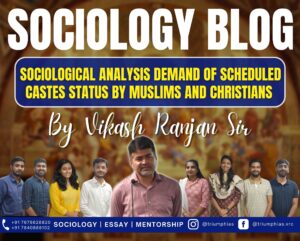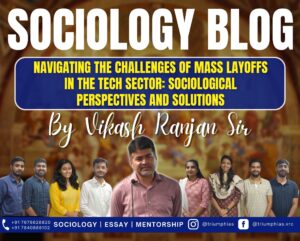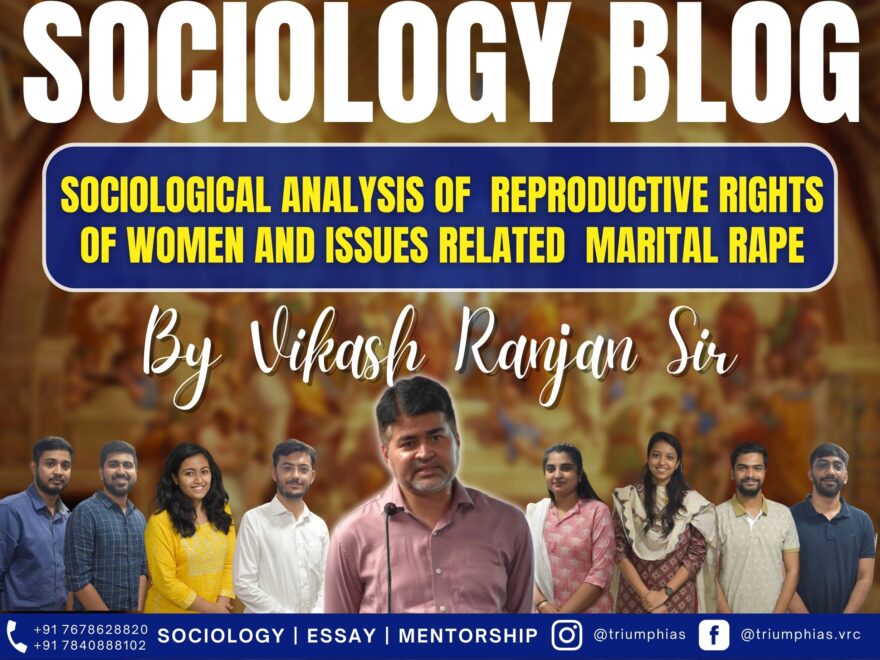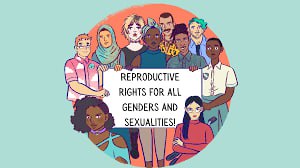A STEP FORWARD FOR ABORTION RIGHTS AND BLOW TO EXCEPTION OF MARITAL RAPE
(Relevant for Sociology Optional for Civil Services Examination)
Paper 1: Family, Household, Marriage
Paper 1: Family and Marriage in India

CONTEXT:
The Supreme Court has extended the right to safe and legal abortion upto 24 weeks of pregnancy to all women in the country, regardless of marital status.
Sociological analysis of reproductive rights● Functionalists like G. P. MURDOCK AND PARSONS argues that reproduction is an essential function of family and they emphasize on the expressive role of women. ● Similarly traditional role of family is legitimization of sexual relations. ● Simone de Beauvoir: argued for women’s reproductive rights as an essential aspect of women’s liberation. She challenged traditional gender roles and emphasized the need for women to have control over their reproductive choices in order to achieve full autonomy and equality. ● Audre Lorde: , highlighted the intersectionality of reproductive rights and social justice. She argued that reproductive justice goes beyond the right to abortion and encompasses the right to have children, access to reproductive healthcare, and freedom from reproductive coercion and injustice. ● Shulamith Firestone: emphasized the significance of reproductive rights in dismantling patriarchy. In her book “The Dialectic of Sex,” she argued for the development of reproductive technologies to liberate women from the burdens and constraints of biological reproduction. S.C. DUBE: in his village study he found that the traditional norms want that women should consider her husband as master and should serve him faithfully. Husband is an authoritative figure in the family and his will should be dominating in the domestic sphere |
EXISTING LAW AND SUPREME COURT JUDGEMENT
- Unconditional abortion is not permitted in India. Abortion is illegal in India under SECTION 312 AND 313 of IPC; unless it is performed in a manner prescribed under Medical Termination of Pregnancy Act, 1971.(M.T.P. ACT)
- MTP ACT, 1972 was amended in 2021
- Extended the MTP ACT services under failure of contraceptive clauses to any women for safe abortion based on women’s choice irrespective of marital status.
- Increased gestational limit from 20 to 24 weeks for special categories of women.
- Advice of one doctor is needed for terminating the pregnancy of gestation period up to 20 weeks, and two doctors upto 24 weeks.
- The particulars of a woman whose pregnancy has been terminated cannot be revealed except to a person authorized by law.
- Supreme Court Judgment
- It held that Rule 3B should be interpreted as extending to any woman who has undergone a material change of circumstances
- Supreme Court ruled that unmarried women are also entitled to seek termination of 24 weeks of pregnancy arising out of a consensual relationship
- Significance of Supreme Court Judgment : This is a landmark decision for women as it places them at the very center of the abortion decision. Three distinct contributions are of note
- SUPREME COURT provided purposive interpretation and held that the objective of act is to provide legal and safe medical abortion to women.
- It observed that if Rule 3B(c) was to be interpreted such that its benefits extended not only to married women, otherwise it would perpetuate the stereotype that only married women indulge in sexual intercourse.
- It centered abortion on a woman’s own estimation of her circumstances and highlighted women’s bodily autonomy.
- It held that marital rape would be rape for the purposes of the MTP Act. It further states that MTP rules create an ‘artificial distinction between married and single women’ and this is “not constitutionally sustainable”.
- It has also implications for the LGBTQ+ community, recognized that familial relationships go beyond the conventional notion of marriage, to include domestic, unmarried partnerships and queer relationships, which are “as real as their traditional counterparts.
Challenges in abortion in India
- As per National Health and Family Survey, 2015-16, only 53% of abortions are performed by registered medical doctors in India.
- Several inscriptions and religious texts oppose the idea of abortion which hinders development of social acceptance.
- Social stigmas attached to unmarried women becoming pregnant, illegality of unmarried women seeking abortions, loss of privacy victims of rape etc.
- The abortion debate asks whether it can be morally right to terminate a pregnancy before normal childbirth. There is pro choice and pro life debate.
Sample Question for UPSC Sociology Optional Paper:
Question 1: How do Functionalists like G.P. Murdock and Parsons view the issue of reproductive rights in the context of family?
Answer:
Functionalists see reproduction as an essential function of the family and emphasize the expressive role of women, often sidelining women’s agency in reproductive choices.
Question 2: Discuss the impact of the Supreme Court’s recent ruling on the exception of marital rape in Indian society.
Answer:
The Supreme Court’s ruling challenges the traditional patriarchal norms that legitimize marital rape, empowering women and upholding their right to bodily autonomy within the domestic sphere.
Question 3: What is the significance of the Supreme Court’s judgment on extending abortion rights to unmarried women?
Answer:
The judgment challenges societal stereotypes and stigmas, affirming women’s bodily autonomy and reproductive rights, irrespective of marital status.
Question 4: How do social stigmas affect the exercise of abortion rights in India?
Answer:
Social stigmas, particularly those related to unmarried women and premarital sex, often deter women from seeking legal and safe abortions, pushing them towards unsafe methods.
Question 5: In what ways does the Supreme Court’s recent ruling have implications for the LGBTQ+ community in India?
Answer:
The ruling recognizes non-traditional family structures, including queer relationships, thereby broadening the scope of reproductive and sexual rights to include the LGBTQ+ community.
Related Blogs
 |
 |

To master these intricacies and fare well in the Sociology Optional Syllabus, aspiring sociologists might benefit from guidance by the Best Sociology Optional Teacher and participation in the Best Sociology Optional Coaching. These avenues provide comprehensive assistance, ensuring a solid understanding of sociology’s diverse methodologies and techniques.
META TAGS:
Reproductive Rights, Sociological Analysis for Reproductive Rights, Types and forms of family, Lineage and descent, patriarchy and sexual division of labour, Contemporary trends, Sociological analysis, Patriarchy, Patriarchy entitlements and sexual division of labour, Supreme Court of India, Abortion Rights, Reproductive Rights, Sociological analysis, Marital Rape, Functionalism, Simone de Beauvoir, Audre Lorde, Shulamith Firestone, MTP Act, Section 312, Section 313, Social Stigma, Pro Choice, Pro Life, LGBTQ+ Sociological analysis,
Why Vikash Ranjan’s Classes for Sociology?
Proper guidance and assistance are required to learn the skill of interlinking current happenings with the conventional topics. VIKASH RANJAN SIR at TRIUMPH IAS guides students according to the Recent Trends of UPSC, making him the Best Sociology Teacher for Sociology Optional UPSC.
At Triumph IAS, the Best Sociology Optional Coaching platform, we not only provide the best study material and applied classes for Sociology for IAS but also conduct regular assignments and class tests to assess candidates’ writing skills and understanding of the subject.
Choose The Best Sociology Optional Teacher for IAS Preparation?
At the beginning of the journey for Civil Services Examination preparation, many students face a pivotal decision – selecting their optional subject. Questions such as “which optional subject is the best?” and “which optional subject is the most scoring?” frequently come to mind. Choosing the right optional subject, like choosing the best sociology optional teacher, is a subjective yet vital step that requires a thoughtful decision based on facts. A misstep in this crucial decision can indeed prove disastrous.
Ever since the exam pattern was revamped in 2013, the UPSC has eliminated the need for a second optional subject. Now, candidates have to choose only one optional subject for the UPSC Mains, which has two papers of 250 marks each. One of the compelling choices for many has been the sociology optional. However, it’s strongly advised to decide on your optional subject for mains well ahead of time to get sufficient time to complete the syllabus. After all, most students score similarly in General Studies Papers; it’s the score in the optional subject & essay that contributes significantly to the final selection.
“A sound strategy does not rely solely on the popular
Opinion of toppers or famous YouTubers cum teachers.”
It requires understanding one’s ability, interest, and the relevance of the subject, not just for the exam but also for life in general. Hence, when selecting the best sociology teacher, one must consider the usefulness of sociology optional coaching in General Studies, Essay, and Personality Test.
The choice of the optional subject should be based on objective criteria, such as the nature, scope, and size of the syllabus, uniformity and stability in the question pattern, relevance of the syllabic content in daily life in society, and the availability of study material and guidance. For example, choosing the best sociology optional coaching can ensure access to top-quality study materials and experienced teachers. Always remember, the approach of the UPSC optional subject differs from your academic studies of subjects. Therefore, before settling for sociology optional, you need to analyze the syllabus, previous years’ pattern, subject requirements (be it ideal, visionary, numerical, conceptual theoretical), and your comfort level with the subject.
This decision marks a critical point in your UPSC – CSE journey, potentially determining your success in a career in IAS/Civil Services. Therefore, it’s crucial to choose wisely, whether it’s the optional subject or the best sociology optional teacher. Always base your decision on accurate facts, and never let your emotional biases guide your choices. After all, the search for the best sociology optional coaching is about finding the perfect fit for your unique academic needs and aspirations.
Follow us :
🔎 https://www.instagram.com/triumphias
🔎https://www.youtube.com/c/TriumphIAS
https://t.me/VikashRanjanSociology
Find More Blogs
|
Scope of the subject and comparison with other social sciences |
|||
|
|
|
|
Modernity and social changes in Europe |



2 comments